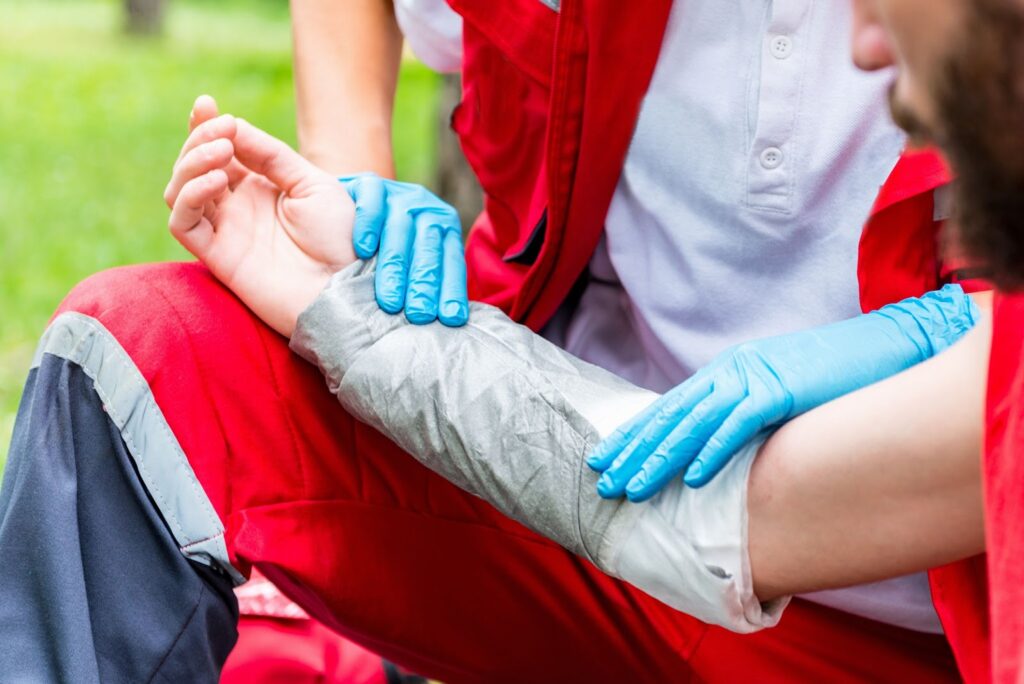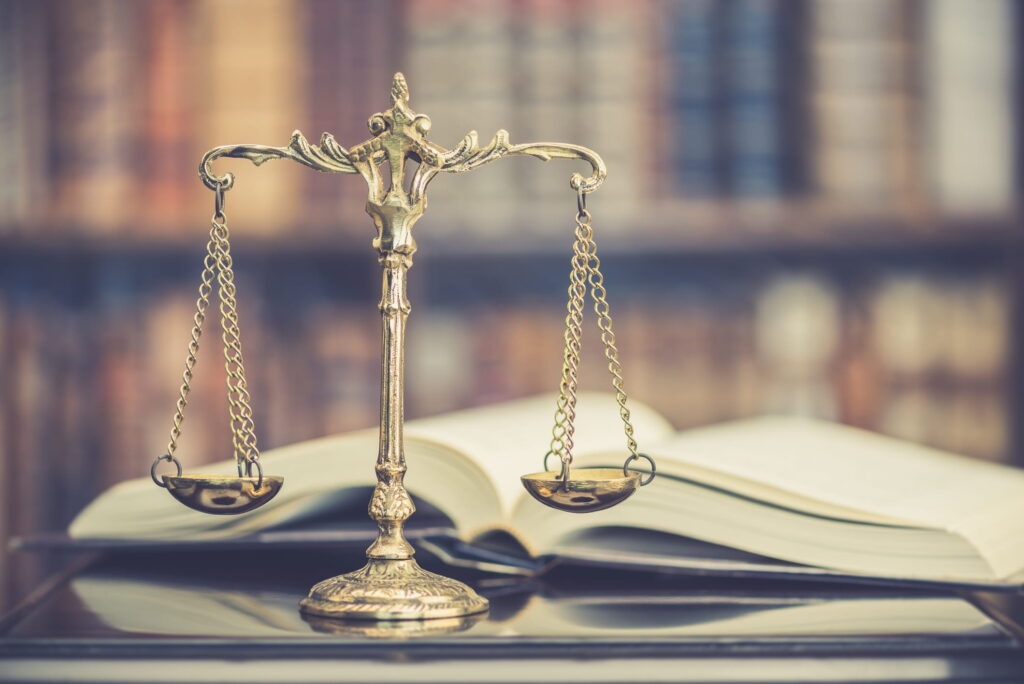What Should I Do If I Suffer From A Burn Injury At Work?
- The Risks of Burn Injuries at Work
- Common Causes of a Burn Injury at Work
- Actions to Take After Suffering from a Burn Injury at Work
- Should I report my burn injury even if it seems minor?
- When is the best time to hire a burn injury lawyer if I was injured?
- You Deserve Fair Compensation
- Related Catastrophic Injury Resources

Workplace accidents and injuries happen every day and in any industry. According to a study by the U.S. Bureau of Labor Statistics (BLS), more than 5,100 workers died in 2021 from workplace injuries. Including non-fatal workplace injuries, American employers filed 2.6 million injury and illness reports, equal to over 7,100 reports per day.
Workplace burn injuries are common, with up to 45% of all burn injuries occurring in the workplace. A burn injury at work can be costly and stressful, so it’s a good idea to talk to a burn injury lawyer to find out your legal options and what you should do after your burn injury.
The Risks of Burn Injuries at Work
Since almost half of all burn injuries occur at work, you’re nearly as likely to suffer a burn injury at work as anywhere else. Professionals in some occupations have a higher risk of suffering a workplace burn injury. Common types of burn injuries include first-degree, second-degree, third-degree, and fourth-degree burns.
First-degree burns affect the top layer of your skin, and the only permanent damage may be discoloration, while second-degree burns penetrate the skin. The most severe burns are third-degree, fourth-degree, fifth-degree, or sixth-degree burns, which can potentially reach to the bone.
Common Causes of a Burn Injury at Work
The primary sources of workplace burns include the following:
- Chemical burns. You can suffer chemical burns if your skin or eyes come in contact with certain chemicals, such as paint thinner.
- Electrical burns. Electrical burns, obviously, involve contact with electricity. This contact may be from touching open wires or using faulty equipment.
- Radiation burns. Radiation burns can stem from radiation exposure. For example, a radiation therapist could be exposed while treating patients. X-ray technicians can also be exposed to radiation. Even UV rays can cause radiation burns. Anyone exposed to sunlight during working hours is at risk.
- Thermal burns. Thermal burns stem from exposure to hot objects or heat. Suppose you work in a kitchen and spill boiling water on your hand. Scalding is one example of a thermal burn.
Although many jobs could involve exposure to sunlight and potential sunburns, there are some occupations where employees are at a greater risk of sustaining a burn injury of any kind. Workers with higher rates of burn injuries include the following:
- Construction workers. Construction workers are at risk because of prolonged exposure to UV rays, potential exposure to electricity, and the use of burn-causing chemicals, such as gasoline.
- Electricians. Electricians may spend several hours outdoors each day, exposing them to UV rays. Electricians also handle electrical wires and equipment, which are potential sources of electrical burns.
- Firefighters. Firefighters remove people from burning buildings and attempt to control or stop fires. They can be burned through direct exposure to fire or hazardous chemicals.
- Food service workers. Food service workers often use or work near several heat sources, including burners and boiling water, putting them at risk of workplace burn injuries.
- Landscape workers. Landscape workers have a higher risk of suffering workplace injuries than many professionals. Using gasoline and herbicides puts landscape workers at risk of chemical burns, and working outdoors increases their risk of suffering radiation burns. Landscape workers can also receive thermal burns from heat sources, such as machinery or equipment that produces hot air.
- Manufacturers. Manufacturing workers can receive electrical burns from equipment, thermal burns from heat sources, and chemical burns from chemicals used in production.
- Miners. Miners use multiple chemicals to perform routine tasks, and exposure to those chemicals may cause chemical burns.
Actions to Take After Suffering from a Burn Injury at Work
Even first-degree burns can cause permanent discoloration, and you might not understand the extent of your injuries. Anyone who suffers a burn injury should take the following steps:
- Seek medical attention. In severe cases, delaying medical treatment can lead to a life-threatening infection. Even minor burns need prompt treatment. A medical diagnosis is also essential for seeking workers compensation benefits and receiving compensation for lost wages and medical bills.
- File a report. You must file an incident report and notify your supervisor of your workplace injury. Your employer can supply the documents you must complete to apply for workers’ compensation.
- Gather evidence and produce documentation. Your medical records are part of your documentation establishing your injuries and their cause. You should also gather any evidence available, including the names of witnesses, video footage, and photos. Create a journal documenting your injuries and describe them. Make notes about how your injuries impact your life. Note if your injuries prevent you from engaging in regular activities. Although you may start documenting your injuries and expenses before you consult and hire an attorney, this is a long-term task that will continue after you apply for workers’ compensation.
- Complete your workers’ compensation application. Fill out the documents supplied by your employer and ensure your employer submits your claim application.
- Hire a catastrophic injury lawyer. You may have grounds to pursue a lawsuit against your employer or another party responsible for your burns. Personal injury attorneys have the insight needed to determine if you have a case. A free consultation offers you a no-risk opportunity to identify your legal options and find an attorney who can take your case.
- Resolve your case. Your attorney may help you negotiate a settlement or may present evidence at trial.
Should I report my burn injury even if it seems minor?
Even minor burns can significantly impact your life. For example, a model may lose work opportunities due to discoloration of even a small amount of skin. Burn injury victims should report their injuries and explore their options because they may have grounds for a burn injury case if they can prove their employer’s negligence caused their injury.
When is the best time to hire a burn injury lawyer if I was injured?
Whatever one does for a living, most people count their employment as a significant part of their lives, both in time and finances. The last thing any of us wants to deal with is a workplace injury. If it does happen, however, Bachus & Schanker’s experienced catastrophic injury attorneys are standing by to discuss your case.
It’s never too soon to contact a burn injury attorney when you are injured on the job. You can contact us while you’re en route to receive medical treatment or after you get home from the hospital. Our attorneys are available to answer your questions and work to get you the compensation you deserve.
Sources
Alexander, B. et al. (2021). Workers’ Compensation Data Sheds Light on Hazards in Landscaping.
Injuries, Illnesses, and Fatalities. (2023).
Mian, M.A.H. et al. (2011). Workplace-related burns.
You Deserve Fair Compensation
Don’t let the insurance companies intimidate you into accepting less than you deserve. We’re ready to fight for you.
Related Catastrophic Injury Resources

Written and Legally Reviewed By: Kyle Bachus
4.6 ★★★★★ 1,461 Google Reviews
Kyle is a member of the Colorado and Florida Bar associations and has served on the Board of Directors of the Colorado Trial Lawyers Association for more than twenty years in total. Over the years, Kyle has achieved justice for many clients. He has served on numerous committees and repeatedly won recognition from his peers at both the state and national level. He is proud of the role he has played in the passage of state and national legislation to protect consumers and is a frequent speaker and guest lecturer.










